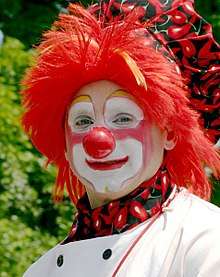bohóc
Hungarian

bohóc
Etymology
[1835] bohó (“playful, foolish”) + -c (“noun-forming suffix”). Created during the Hungarian language reform which took place in the 18th–19th centuries.[1]
Pronunciation
- IPA(key): [ˈboɦoːt͡s]
Audio (file) - Hyphenation: bo‧hóc
Declension
| Inflection (stem in -o-, back harmony) | ||
|---|---|---|
| singular | plural | |
| nominative | bohóc | bohócok |
| accusative | bohócot | bohócokat |
| dative | bohócnak | bohócoknak |
| instrumental | bohóccal | bohócokkal |
| causal-final | bohócért | bohócokért |
| translative | bohóccá | bohócokká |
| terminative | bohócig | bohócokig |
| essive-formal | bohócként | bohócokként |
| essive-modal | bohócul | — |
| inessive | bohócban | bohócokban |
| superessive | bohócon | bohócokon |
| adessive | bohócnál | bohócoknál |
| illative | bohócba | bohócokba |
| sublative | bohócra | bohócokra |
| allative | bohóchoz | bohócokhoz |
| elative | bohócból | bohócokból |
| delative | bohócról | bohócokról |
| ablative | bohóctól | bohócoktól |
| Possessive forms of bohóc | ||
|---|---|---|
| possessor | single possession | multiple possessions |
| 1st person sing. | bohócom | bohócaim |
| 2nd person sing. | bohócod | bohócaid |
| 3rd person sing. | bohóca | bohócai |
| 1st person plural | bohócunk | bohócaink |
| 2nd person plural | bohócotok | bohócaitok |
| 3rd person plural | bohócuk | bohócaik |
References
- Zaicz, Gábor. Etimológiai szótár: Magyar szavak és toldalékok eredete (’Dictionary of Etymology: The origin of Hungarian words and affixes’). Budapest: Tinta Könyvkiadó, 2006, →ISBN
This article is issued from
Wiktionary.
The text is licensed under Creative
Commons - Attribution - Sharealike.
Additional terms may apply for the media files.